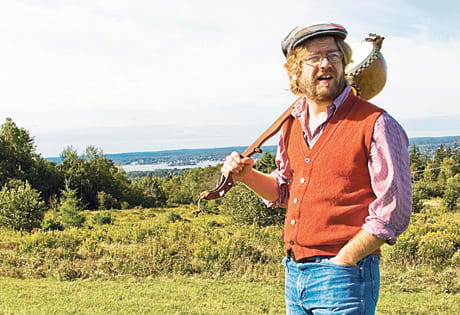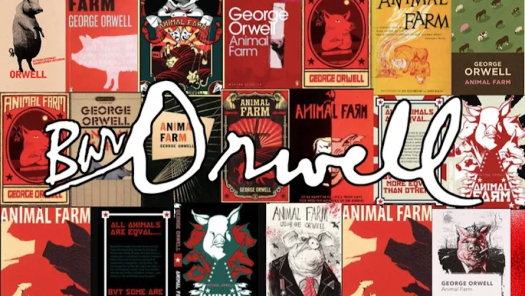With the roar of an appreciative audience behind him, Old Man Luedecke descended the steps of the main stage at Sappyfest IV in Sackville, NB this past August with a look of bemused befuddlement on his face. Judging from past experience at festivals across the country, the scene's familiar but he still seems overwhelmed. With just a banjo, his songs, and his stomping foot, the Chester, NS resident was truly captivating; unlike most of his fellow performers, Luedecke is granted an encore and, like a young version of Pete Seeger, tells a short story to introduce his infectious sing-a-long, "Big Group Breakfast."
Even though loyal followers and curious onlookers alike adore his music, and his latest album Proof of Love won a 2009 Juno Award, Chris Luedecke politely deflects any notion that his banjo songbook might be catching on. "No, I don't think so," he begins before reconsidering. "Well maybe it is. It seems to be working out really nicely right now. I've just been doing it for a while and maybe my show takes a little growing into from everyone's perspective. And then it seems to get better every time."
Though he's already accomplished much as an emerging leader in Canadian folk, Luedecke came to the music relatively late. Raised in Toronto, he was playing glockenspiel by kindergarten and his father encouraged piano lessons in subsequent years. Luedecke took up clarinet throughout high school but, while pursuing English and religion studies at Montreal's McGill University, he didn't play music at all. He listened to a lot of it though; old-school ska and soul records proved educational in their own right and then, at 22 years old, he inexplicably became smitten with the banjo.
"I just loved the way it had such an infectious rhythm," Luedecke recalls. "Something about the texture of the sound it makes really stands out in any context. If you hear banjo on any type of recording, it occupies its own space in the world; I like that place. And I discovered, as I was writing songs, that I have a short attention span; I love songs that get to the point. Banjo music keeps things moving and just sounded exciting to me ― like something you don't hear all the time. It's odd too; you can do whatever you want with it because people don't know what to expect."
After relocating to Dawson City in the Yukon, Luedecke and his wife moved to Nova Scotia in 1999 accompanied by a banjo, which he purchased a year earlier. "It was a whim and really an accident in a way," he says of the acquisition. "I had seen someone with one and decided 'I'm gonna get that.' It took over from there, not without a fair amount of work on my part. I took a couple of lessons here and there and was voracious with books about banjo playing and got as many recordings as I could. It just sorta wiped everything else out; once I started writing songs with it, it was game over. It's a really good harness for what I had to say and was a real revelation."
Stylistically, Luedecke employs a frailing or clawhammer banjo technique, which was popular in '60s folk circles. "It's a complicated history," he says. "Like any folk style, there are camps where people think things should be a certain way and not another way. I didn't necessarily care; I found my own way into it. I really got into people like Ramblin' Jack Elliott who flat-picks the guitar and he's an influence on my banjo playing. I also really love Bascom Lamar Lunsford; there's something so honest and natural about what he did that I aspire to."
"There's still a lot to do with the banjo," Luedecke continues. "I'd like to break free of the rhythms I've been playing but I'm not exactly sure what happens next. There's a groove I need to find. I always set out doing something pure and I want to keep that purity while making things larger. I'd like to keep digging and write some really solid songs that other people want to sing. There's a lot to be done for sure."
Even though loyal followers and curious onlookers alike adore his music, and his latest album Proof of Love won a 2009 Juno Award, Chris Luedecke politely deflects any notion that his banjo songbook might be catching on. "No, I don't think so," he begins before reconsidering. "Well maybe it is. It seems to be working out really nicely right now. I've just been doing it for a while and maybe my show takes a little growing into from everyone's perspective. And then it seems to get better every time."
Though he's already accomplished much as an emerging leader in Canadian folk, Luedecke came to the music relatively late. Raised in Toronto, he was playing glockenspiel by kindergarten and his father encouraged piano lessons in subsequent years. Luedecke took up clarinet throughout high school but, while pursuing English and religion studies at Montreal's McGill University, he didn't play music at all. He listened to a lot of it though; old-school ska and soul records proved educational in their own right and then, at 22 years old, he inexplicably became smitten with the banjo.
"I just loved the way it had such an infectious rhythm," Luedecke recalls. "Something about the texture of the sound it makes really stands out in any context. If you hear banjo on any type of recording, it occupies its own space in the world; I like that place. And I discovered, as I was writing songs, that I have a short attention span; I love songs that get to the point. Banjo music keeps things moving and just sounded exciting to me ― like something you don't hear all the time. It's odd too; you can do whatever you want with it because people don't know what to expect."
After relocating to Dawson City in the Yukon, Luedecke and his wife moved to Nova Scotia in 1999 accompanied by a banjo, which he purchased a year earlier. "It was a whim and really an accident in a way," he says of the acquisition. "I had seen someone with one and decided 'I'm gonna get that.' It took over from there, not without a fair amount of work on my part. I took a couple of lessons here and there and was voracious with books about banjo playing and got as many recordings as I could. It just sorta wiped everything else out; once I started writing songs with it, it was game over. It's a really good harness for what I had to say and was a real revelation."
Stylistically, Luedecke employs a frailing or clawhammer banjo technique, which was popular in '60s folk circles. "It's a complicated history," he says. "Like any folk style, there are camps where people think things should be a certain way and not another way. I didn't necessarily care; I found my own way into it. I really got into people like Ramblin' Jack Elliott who flat-picks the guitar and he's an influence on my banjo playing. I also really love Bascom Lamar Lunsford; there's something so honest and natural about what he did that I aspire to."
"There's still a lot to do with the banjo," Luedecke continues. "I'd like to break free of the rhythms I've been playing but I'm not exactly sure what happens next. There's a groove I need to find. I always set out doing something pure and I want to keep that purity while making things larger. I'd like to keep digging and write some really solid songs that other people want to sing. There's a lot to be done for sure."




